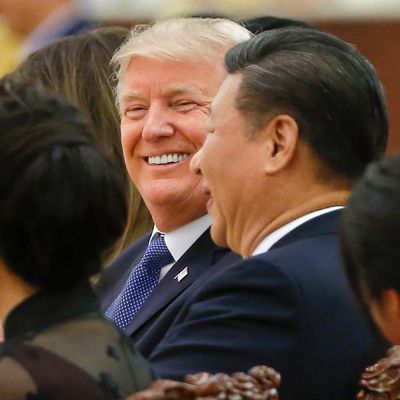
Ever since taking office, President Trump has faced two conflicting imperatives. One, he wants to be seen to be “tough” on China trade, and two, he wants the stock market to go up. The problem is, the stock market hates trade wars, and when the president threatens (or actually imposes) higher tariffs on Chinese goods, stock prices fall.
A question I’ve periodically asked conservative economic thinkers over the last couple of years has been: If tariffs are so bad, why are the economy and the stock market performing so strongly under a protectionist president? And the answer they’ve usually given me is that, so far, Trump has been more bark than bite: The global tariffs on imported metals and the China-specific tariffs have been negative at the margin, but they don’t affect most of the economy, and they are more than offset by preexisting positive economic trends, appropriate monetary policy, and growth-boosting choices the president has made on taxes and regulation. If the president went full-on trade war, that could all change.
So the president’s sensitivity to stock prices and the stock market’s sensitivity to the threat of a full-on trade war have led to a series of cycles. The president makes big threats, and stocks fall; then, there is calm, or the president says talks are productive, or he delays deadlines to impose tariffs, and stocks go up. So far, the president’s desire to preside over a booming stock market has won out over his long-standing protectionism — despite it being one of the few policy areas where Trump has expressed a consistent ideology through his decades intermittently commenting on politics. The president even defanged his own threat to blow up the North American Free Trade Agreement by agreeing to a slightly changed deal with Canada and Mexico and then not even trying very hard to get Congress to ratify the changes.
So, what’s with this week’s latest threat to impose new, steeper tariffs if the next round of trade negotiations with China, due to start on Wednesday, don’t produce a deal by Friday? This threat caused the Dow Jones to open down more than 400 points on Monday, indicating the markets are taking it at least semi-seriously as a sign that Trump has stopped being polite and started getting real.
One possibility, floated to The Wall Street Journal by the economist Chad Bown at the Peterson Institute for International Economics, is that a deal is close at hand and Trump wants to make it appear the deal materialized because he “got tough.” That would be a classic Trump negotiating move, as it would jeopardize a nearly done deal by causing embarrassment to the other side.
Another possibility is that Trump is for real: He feels buoyed by strong poll numbers on his handling of the economy and strong recent stock market performance, and feels he can weather a bit of a stock market decline in pursuit of a long-held policy goal. Of course, we’d see if he still feels that way after the markets fall much more steeply when they realize he’s not bluffing and the tariffs actually go into effect.
A third possibility is that he’s flailing: He’s annoyed that the Republican-controlled Senate wouldn’t take up his silly Federal Reserve candidates and that neither house of Congress will move his replacement for NAFTA, and tariffs feel like an avenue for him to assert control over economic policy. A problem here is that a pliant Fed would have been a nice thing to have when starting a trade war, as Trump would have surely liked some interest-rate cuts to juice stock prices and offset trade-war-driven losses.
Over the last two-plus years, Trump’s overwhelming pattern on trade has been to chicken out, and the Chinese have taken note of this. The last time Trump tried to escalate with China, in September, President Xi Jinping canceled the next round of scheduled trade meetings, and waited for Trump to lose the midterm elections and ask to come back to the table. Trump has already twice delayed his deadline to impose the new Chinese tariffs that he threatened again yesterday. For that reason, if he wants to convince the Chinese he’s for real, he’ll actually have to impose them for real. And he’ll have to endure the stock market decline that would result.





























